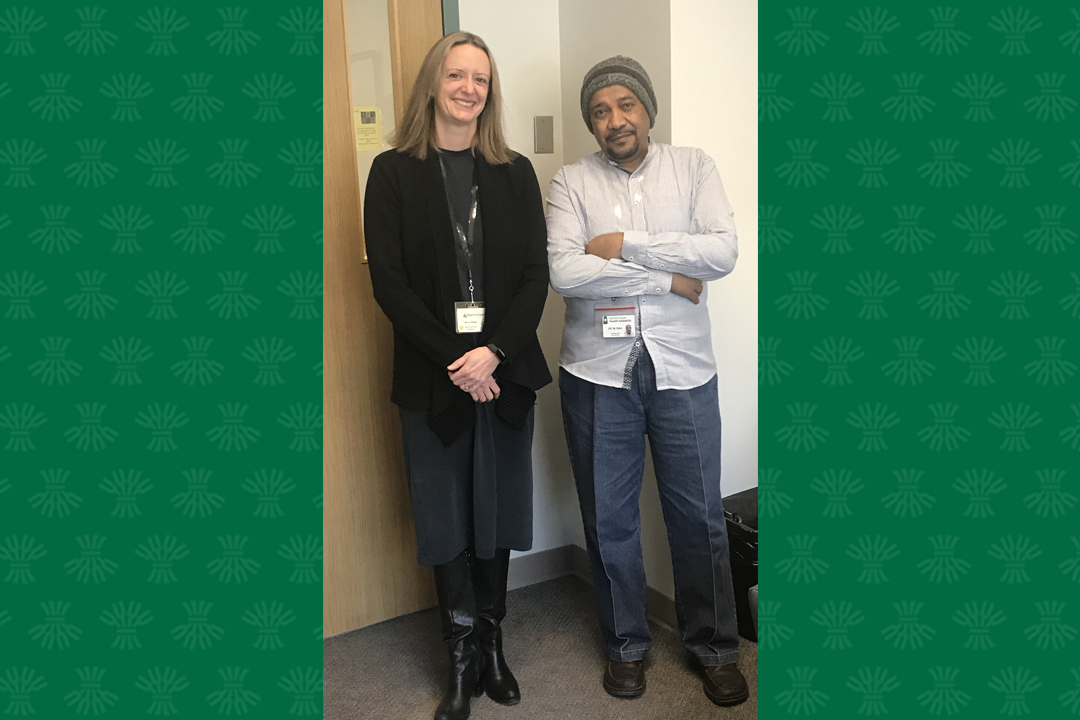
The inspiration behind Dr. William Ahlijah’s Memorial Clinical Excellence Award
Establishing a memorial award is a great way to commemorate someone who changed the community for the better, made an impact on your life or holds a special place in your heart.
A memorial award provides a meaningful way for a college, department or group of colleagues to honour that special person while carrying their legacy forward to tomorrow’s doctors and health care professionals.
Dr. Mohamed E.A. Eisa is credited with creating such an award. He is an assistant professor in the Department of Psychiatry, consultant psychiatrist and section head of inpatient psychiatry program.
Eisa spearheaded a group of Regina faculty members in the Department of Psychiatry to establish The Dr. William Ahlijah’s Memorial Clinical Excellence Award in memory of their highly respected colleague.
We talked to him about the experience.
Where did the idea for the Dr. William Ahlijah’s Memorial Clinical Excellence Award come from?
Dr. Ahlijah and I shared a lot of things in common, to be honest with you. I joined the (former) Health Region in north Regina in 2006. I was a young doctor who had just finished my training in England. I was new and I met Dr. Ahlijah who was from Africa, just like myself.
He was really like a big brother to all of us foreign doctors from Africa, in particular, those of us who moved over the years to Canada, especially in the specialty of psychiatry. He helped each one of us settle in the new environment and cope with everything. He was just great with all of us.
How did Dr. Ahlijah inspire you personally?
I continued to work with him closely over the years. I became the section head of the inpatient psychiatry program and by that time, actually, it was five or six years ago, he was retired. Every time we were struggling with a shortage of psychiatrists, we would go to him and ask him to give us a hand. He wouldn’t even discuss anything about dates or whatever, he just asked us, “Okay, what do you want me to help with?”
That he would just come and help, I was very impressed by him as a human being, as a psychiatrist. How he cared for every patient and how he always kept up his clinical knowledge and skills, and new developments in psychiatry. He was an example of an excellent human being who touched the lives of all of us, his colleagues, and every type of patient.
Was Dr. Ahlijah known for any specific achievements?
One of Dr. Ahlijah's major qualities, as I said, was that he cared about clinical excellence. The continuous learning never stopped and he never stopped sharing his knowledge within the department. He often went home to Africa and not just for a holiday; he went to teach at the university there. He would take books from here and do lectures there, all for free. Clinical excellence and passing his knowledge and experience to younger trainee doctors in the field of psychiatry was something very big for him. That's why I thought of including clinical excellence in the name and making it to support and encourage young doctors who are going to carry on for us.
What’s your fondest memory of him?
It was so hard when he passed away. He was such a wise man. He would say things that just stuck with you. I remember one of the things he was always telling us, “We cure, sometimes. We comfort, most times. We care, always.” I thought someone like him really deserved for us to remember him all the time – to remember, understand and have some aspiration to be even partially like him in the way he conducted his life, cared for his vision, cared for the community.
Was it difficult to create the award?
The moment I thought about it and put it out to my colleagues, everyone was very happy to contribute and make it a reality. The department members, all of them, even people who are not a part of the department but in the other areas of mental health service, were very willing to contribute. I'm glad I started it, but definitely, everyone was so happy and very keen for it to become a reality. I’m very grateful to the College of Medicine for taking this forward and making it happen.
How did you go about setting up the award?
I’m very grateful to Steph Bodnar, the development officer in the College of Medicine, for helping us take this forward. Dr. Andriyka Papish (MD) was instrumental in the establishment of the award. Dr. Papish and Steph worked together to create the terms of reference for the award. They discussed the possibility of creating an endowment and Dr. Papish brought forward the idea to the Department of Psychiatry in Regina. The department faculty agreed that creating an endowment was the best way to honour Dr. Alijhah, as the award exists in perpetuity. They chose to raise funds as a group and together they reached their fundraising goal. Dr. Papish and Steph are confident that the award will generate enough money every year for us to continue to give an award in Dr. Ahlijah’s name.
Do you think this will serve as a model for others to create this kind of award?
You know, I really hope so because there are people everywhere who really pioneer. I see a lot of them in other departments and they deserve to be recognized. This award has been really successful, and I hope it shows that all those who contributed to the establishment and continuous development of health services in general within the province can be remembered.
